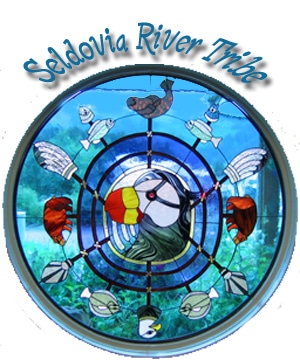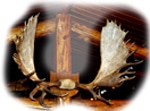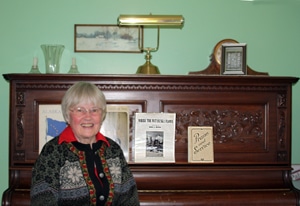This is the 24th in a continuing series about our trip through Canada to Alaska
Pat Sajak often announces the category “Before & After” on “Wheel of Fortune,” a puzzle where two expressions overlap. I decided “Deadliest Catch 22” would fit in that puzzle, with “Deadliest Catch” referring to the TV show about the hardships crabbing in Alaska and “Catch 22” describing a good-bad situation.
Our trip through western Canada and into Alaska has been absolutely spectacular from the standpoint of scenery, wildlife and opportunities to learn about the rich cultures of this vast, somewhat forbidding land. Since you’re reading these blogs, you probably have either been here or you want to take the trip. We hope all you “want-tos” are able to get here – it’s an adventure of a lifetime.
The native tribes and clans of Alaska apparently had a very pleasant lifestyle for up to 6,000 years. Then along came the Russians, who settled in the territory for fishing and trapping. They enslaved natives and decimated the population with disease. As bad as that was, their main impact was on coastal areas and less in the interior.

Tribal logo represents the traditional animals, fish and birds that are significant in sustaining life in Seldovia
Then came the goldrush and discovery of coal and other valuable minerals, which caused a cataclysmic change. Whether all that was good or bad is in the eye of the beholder, but as Walter Cronkite used to say, “That’s the way it is.”
CATCH 22 – The Alaska we as tourists have seen over the past five weeks has been as that segment of the economy, now the state’s second biggest industry. Our caravan is included in the 1,100,000 tourists who arrive here every year, and the number is said to be growing. [http://www.questconnect.org/ak_alaska.htm]
People like Christopher McCandless [whose story is told in the book and movie “Into the Wild”] and other survivalists may absolutely loathe this gift-shop, museum and charter boat economy, but in its defense, so many people from around the world would never get a chance to be among the splendor we have seen.
Alaska would be a wilderness inhabited by the natives, but their lives would still be disrupted by the major industries, beginning the oil transportation and refining, and including fishing, forestry and fur-trapping,. As the “questconnect” website states, “All sectors of Alaska’s economy are natural resource-based,” which does include tourism.
Tuesday Monique and I were in one of the few retail outlets without a gift  shop or a moose head on the wall – McDonald’s in Homer – where we met a local, who has been in Alaska seven years since his wife took a job as a traveling nurse. He wants to leave, he said, but she wants to stay. He said he found Alaska no different from Florida, which thrives on its tourism economy by turning every natural area into a mecca for travelers. Asked what he thought of tourism in Alaska, he acknowledged that it is a must for the survival of the towns, but he worries that there doesn’t seem to be any concern about the industry fading in years to come. He doesn’t see any effort being made to look for additional avenues of revenue.
shop or a moose head on the wall – McDonald’s in Homer – where we met a local, who has been in Alaska seven years since his wife took a job as a traveling nurse. He wants to leave, he said, but she wants to stay. He said he found Alaska no different from Florida, which thrives on its tourism economy by turning every natural area into a mecca for travelers. Asked what he thought of tourism in Alaska, he acknowledged that it is a must for the survival of the towns, but he worries that there doesn’t seem to be any concern about the industry fading in years to come. He doesn’t see any effort being made to look for additional avenues of revenue.
As a recreational vehicle enthusiast, you may hope to see Alaska on the wild side, but without gas stations, RV parks, restaurants and chain grocery stores, and all the other businesses that support the tourist trade, you would never be able to come up into this territory, where you can be wrapped in the grandeur. Just fifty years ago there were very few roads, practically no repair shops or medical facilities. Without the steady line of RVs plying the highways each summer, it would probably revert to wilderness, unseen by all but a few laborers.
Catch 22.

Gerry Keeting of Palmer, Alaska, daughter of 1935 homesteaders under FDR's recovery plan, sits before a 115-year-old piano that was brought to Alaska filled with belongings of the relocating family. There were no road to Palmer in those days.
Another update on the Top of the World (Taylor) Highway from reader Dave Stoeffler:
“We are now in Dawson City. The road was OK. We had to follow a pilot car for a few miles, but, people who came through today said there was no pilot car. There are only the normal repairs going on on both sides of the border. The Taylor Highway to Eagle is still closed, as far as I know.”
From the “Never-Bored RVers,” We’ll see you on down the road.
Virgil Owen
I have lived here for a little over a year and I love it. The people are sometimes a little odd but they are good people. I have seen locals help our guest learn how to fish here in Kenai on more than one occasion. Like anywhere else I have ever lived there are good people and there are those who are just not very happy campers. I also lived in Homer for a short period of time and found the people well weird. Maybe that is why you see bumper stickers there that say “keep Homer weird”. Homer is a great place to visit but I did not find it to my liking for living there. I love Kenai and Soldotna.
David Kocher
Jeez Roger, who pissed you off? I have lived here 31 years, and the only smug and elite people I have met since I have been here, are the ones visiting that are decked out in their expensive Orvis waders and fly rods who want to keep this state as a national park or zoo! I do not know anyone that lives here, or any business, that does not appreciate tourism, and I disagree with your contention that tourism brought about all the changes you list. Senator Stevens was instrumental in making most of these changes and the improved infrastructure, which changed our status from a “foreign country” or territory to an actual member of the United States. When I moved here in ’79, a three-minute call Outside would cost a roll or quarters. Mailing anything larger than an envelope used to cost a fortune. Now I pay eight cents a minute for my cell phone plan, and mailing a package here does not cost much more than a package to Seattle. Sure we might get a bit frustrated with the slow traffic along the Seward Highway in the summer, but I do not like driving it the winter either. I am sorry you apparently had a bad experience, but it sounds like, as usual, one bad experience tainted your opinion. Please do not judge us on this one bad experience. I came to visit a friend long ago, and forgot to leave! Take care.
Jerry X Shea
Least us not forget the guy with the 1968 pickup with a camper shell who talks about how great the salmon fishing was (in the good ol’days) when only 3 guys stood in the river and then they went to the one bar in town for a drink. Today, 500 guys are fishing within a one mile strip of that same river (called combat fishing) and the town has 5 bars, hotels, resturants, gift stores and this guys hates it all.
Alaska and its natives are not in “bad shape” because of tourists.
Roger Garner
Barry, your ‘Catch 22’ comments condensed a great deal of insight into very few words. The dollars that tourism brings to AK allows most of the locals to be locals. The infrastructure supported by tourism creates everything from grocery stores to hospitals to schools to cell phone service, ad infinitum. Those smug and elite ‘locals’ who don’t have the presence of mind to see this should put down their comic books and be thankful for those of us who leave a considerable amount of money to recirculate in their unique state.